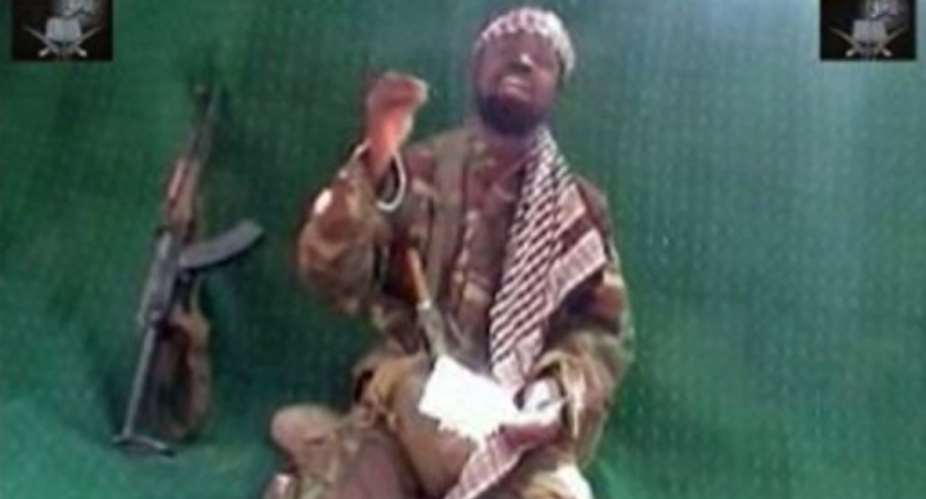KANO, Nigeria (AFP) - Abubakar Muhammad Shekau, who Nigeria's military said may have been killed, has led Boko Haram through three years of a brutal insurgency, reportedly masterminding gruesome attacks that left hundreds dead.
The military said there was evidence Shekau might have been mortally wounded in a gunbattle between July 25 and August 3 in the northeast, but the security forces were still seeking confirmation.
Little is known about the shadowy insurgent commander, even if he has appeared in a series of video messages, claiming credit for attacks on both Muslims and Christians, while voicing support for the massacre of students.
Designated a global terrorist by the United States, which put a $7 million (5.3 million euro) bounty on his head, Shekau has repeatedly denounced the West, insisting his deadly insurgency is aimed at creating an Islamic state in northern Nigeria.
In a video message obtained by AFP on August 12 and which the military says was a fake, Shekau appeared to address claims that he had been killed.
"You have not killed Shekau," the person says in the video, seated with a Kalashnikov resting on his right shoulder, a pose Shekau often adopted in such videos.
"We are in good health," he added.
Shekau's publicly released statements have included accusations of Muslims being persecuted in Nigeria, claims of Boko Haram's victories over the military and grotesque boastings.
"I enjoy killing anyone that God commands me to kill the way I enjoy killing chickens and rams," he said in a message released last year.
The US Justice Department lists 1965, 1969 and 1975 as possible years of the birth of the wanted Islamist commander.
It is believed he was born in Yobe state in northeastern Nigeria, which borders Borno state, where Boko Haram was founded more than 10 years ago by Mohammed Yusuf, who died in Nigerian custody in 2009.
Shekau claimed command of Boko Haram in 2010. Since then the group's capacity to attack a range of targets appeared to expand.
The Islamists have struck a United Nations building in Nigeria's capital, churches, mosques, politicians, police and the military. They have been blamed for attacks on schools and universities that killed dozens of children.
Boko Haram is believed to be made up of different factions and the extent to which Shekau coordinates and commands attacks has always been unclear.
But most analysts think he deliberately sought to turn the group in a more violent direction following Yusuf's death.
Shekau studied theology under local clerics in the Mafoni area of Maiduguri, Borno state's capital, and enrolled in a government-run school for Islamic studies.
He was said to have met Yusuf through a man named Mamman Nur, thought to be the group's third-in-command at the time of Boko Haram's 2009 uprising in Maiduguri.
The security operation that crushed the revolt left some 800 people dead.
Police claimed Shekau had been killed in the 2009 assault, but he appeared less than a year later in video clips circulated in Nigeria. Some say he was shot in the leg and went into hiding in Chad and Sudan.
In videos, Shekau appears far less charismatic than Yusuf, who rallied youths to his cause by excoriating corruption and lashing out at authorities in rousing speeches.
His messages have often included vivid descriptions of violence including a recent threat to "split open (the) heads" of those who seek to challenge him.
At several points over the last year, Nigeria's government has suggested it was trying to negotiate peace with Boko Haram.
Shekau has consistently sworn off negotiations. "We have never made a truce with anybody," he said in May.
Reports that Shekau was shot in Sambisa forest in the northeast were released by the area military spokesman, but the defence ministry told AFP they were still seeking definitive confirmation of his death.





 Former Kotoko Player George Asare elected SRC President at PUG Law Faculty
Former Kotoko Player George Asare elected SRC President at PUG Law Faculty
 2024 elections: Consider ‘dumsor’ when casting your votes; NPP deserves less — P...
2024 elections: Consider ‘dumsor’ when casting your votes; NPP deserves less — P...
 You have no grounds to call Mahama incompetent; you’ve failed — Prof. Marfo blas...
You have no grounds to call Mahama incompetent; you’ve failed — Prof. Marfo blas...
 2024 elections: NPP creates better policies for people like us; we’ll vote for B...
2024 elections: NPP creates better policies for people like us; we’ll vote for B...
 Don’t exchange your life for wealth; a sparkle of fire can be your end — Gender ...
Don’t exchange your life for wealth; a sparkle of fire can be your end — Gender ...
 Ghana’s newly installed Poland train reportedly involved in accident while on a ...
Ghana’s newly installed Poland train reportedly involved in accident while on a ...
 Chieftaincy disputes: Government imposes 4pm to 7am curfew on Sampa township
Chieftaincy disputes: Government imposes 4pm to 7am curfew on Sampa township
 Franklin Cudjoe fumes at unaccountable wasteful executive living large at the ex...
Franklin Cudjoe fumes at unaccountable wasteful executive living large at the ex...
 I'll 'stoop too low' for votes; I'm never moved by your propaganda — Oquaye Jnr ...
I'll 'stoop too low' for votes; I'm never moved by your propaganda — Oquaye Jnr ...
 Kumasi Thermal Plant commissioning: I pray God opens the eyes of leaders who don...
Kumasi Thermal Plant commissioning: I pray God opens the eyes of leaders who don...
